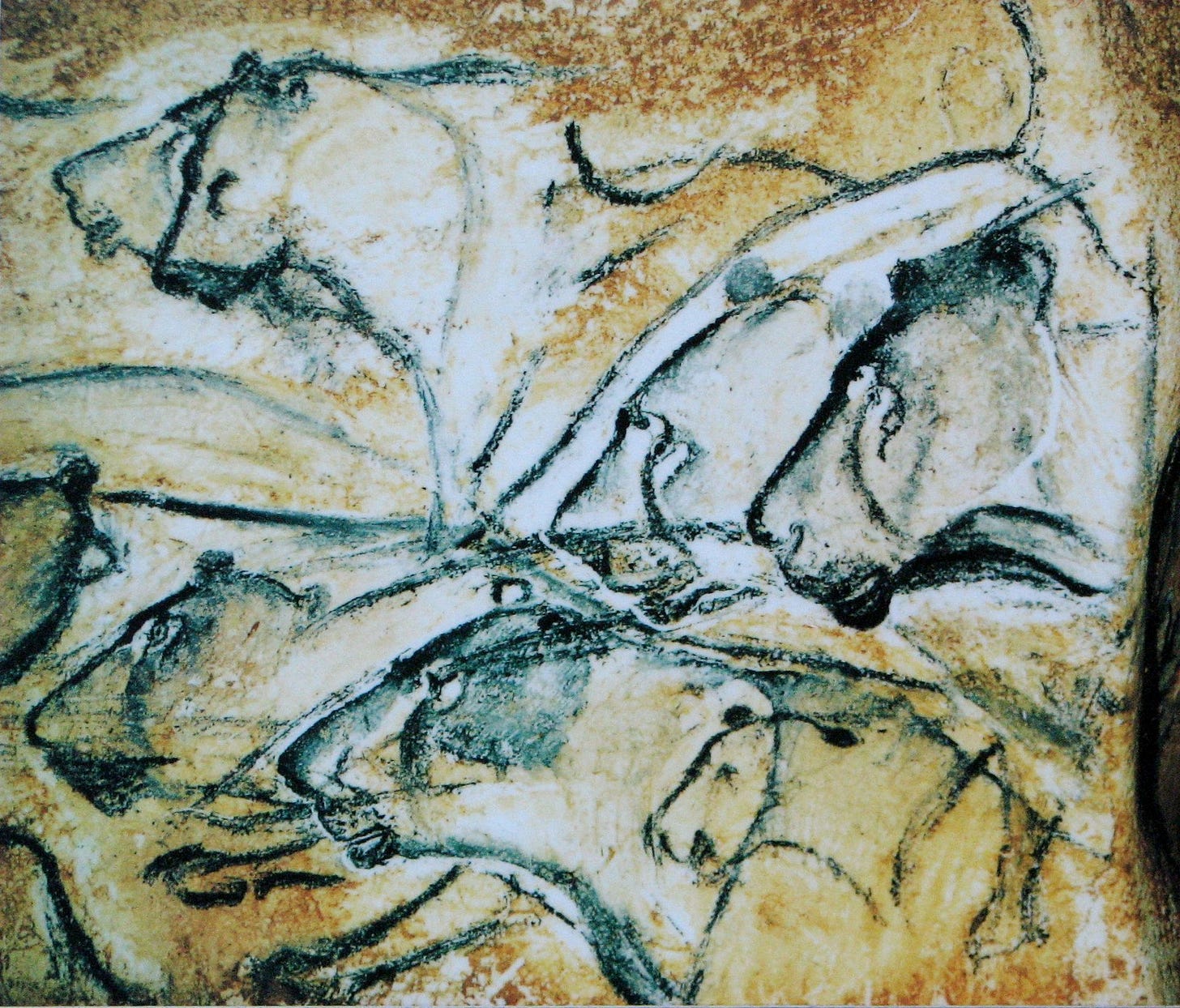Nature
Dear reader,
Anacharsis the Scythian was once asked, which were more numerous, the living or the dead? He replied, "In which category, then, do you place those sailing the seas?"
~ ~ ~
We are snugly insulated from the natural world. The ancient Greeks spoke of those that they themselves considered ancient, the forerunners who roamed the lands to destroy dangerous beasts like the lions that once inhabited Europe. Long before writing was developed, prehistoric tales overflowed with heroes slaying nature’s dangers, and taming the rest.

Lions painted into a cave in France, 33,000 years ago.

Mycenaean lion hunters, 1600 BC
It is hard to appreciate just how safe the world is. It is unlikely any of us will drown on a voyage. We hike through mountain ranges for fun or as a serene retreat. None of us (I hope) go to sleep with an expectation of a violent awakening, even while camping. We do not wonder nightly if we will be eaten or scalped.
Yet so it goes with my chickens: Despite my efforts they still inhabit the natural world. A little gap in fencing, nature oozes in, and carries half of them off. For a few days after, I sleep with the stress and alertness that many animals must summon all of the time. Every night, they are on an ancient sea voyage. Hopefully this time I have built a better boat.
We are able to think of nature as a mossy serenity only because we have done the hard work of taming the earth. We owe our kindly view of nature to an accumulation of technology and the efforts of civilization. When humans step away, the raw vitality of nature is always ready to step in, producing unlimited vines and spores, rapturously claiming every inch of soil, devouring whatever resources it can find. It is not a harmony but an intense competition of carved out territories. Each morning the slowest gazelle must outrun the fastest lion or it will perish, and the slowest lion must overcome a gazelle or it will starve. Tonight, by comparison, Simplicity and I will reheat some pizza. Even the animals we eat have much safer lives, as most of the time (I’m sorry, chickens) we watch over them carefully.
A garden is nature, tamed. To build a beautiful garden is to build a little civilization, and like civilization it collapses easily when unattended or not safeguarded. We often forget this, and take both gardens and civilization for granted. Even far from the countryside, you sometimes find little examples of nature rearing its head.
“After 3 months of absence my potatoes decided to push without limit until making holes in the joints”
The world is a garden we have shaped for hundreds of thousands of years. We improve upon its cultivation, I hope, whenever we can. Nothing can last forever, nothing can be built so perfect it will not need protection, but these truths cannot prevent us from building beautiful things. I think the desire to build and instill beauty and order into the world has been with us almost forever. Perhaps a topic for another time.
~ ~ ~
I live in New Hampshire, the second most forested state, after neighboring Maine. It wasn’t always so wooden. Two hundred years ago it was populated with sheep pasture, like much of New England. Made by settlers clearing land, there are about 260,000 miles of stone walls in New England and New York. Driving around you can easily find them lining the country roads.
Then, over one hundred years ago, the open west offered easy cattle grazing and trains for transport, reducing the relevance of New Hampshire’s sheep. Unlike some other places, open space does not come easily here. When pasture is no longer grazed or mowed, patient nature is ready. White pines quickly shoot up, alders and birches too. Maples will occupy any wet area, and these trees conspire with brush to reclaim the soil for the forest. Defending her new territory, along the edges of the new growth, grape vines and poison ivy will climb and cover. This is not enough to stop your passage, but it is enough to remind you of nature’s grip on the matter.
So when walking through the forests of New Hampshire, as you venture many miles deep, even into centuries old forests, you will often find a maze of the same stone walls that you spy along the roadside. Occasionally, other stone foundations, too.
There is a tale, somewhat obscure in principle: A traveler becomes mesmerized upon finding a stone wall in the forest, and follows its path. He walks idly for hours, perhaps days, he can no longer recall. He looks only at the wall he is following. After a long while he bumps into a bear, who awakes with great fury. He flees in terror, spots an old well, and jumps inside, holding on only to a bush branch that grew through the crevices. Falling dirt tells him the well is dry and deep, and the bear growling tells him it is unsafe above. He feels his arms grow weak. Just then he spots two mice, one black and one white, slowly chewing around the branch of the bush. Soon it will give way, and he knows he will surely die within moments. But while he remains he notices some drops of honey on the leaves of the bush, and with his final strength he reaches with his body, stretches out his tongue, and licks the leaves.
Another time,
s s






"I had not thought death had undone so many." Such quality, Simon. It exudes quality, new and old at the same time. Excited for more.
Great post, Simon. I'd read a similar tale to the one in the last paragraph in Tolstoy's Confessions.